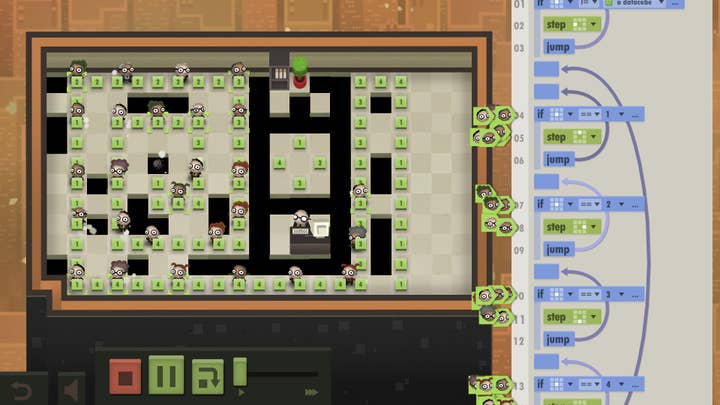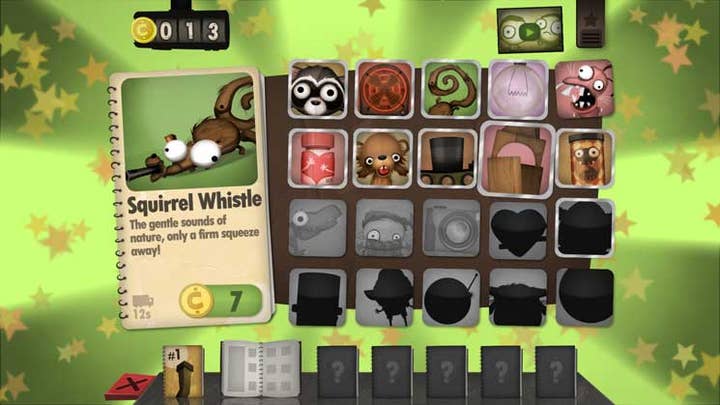"We've never made a game with a jump button, and we don't plan to start now"
Tomorrow Corporation's Kyle Gabler and Kyle Gray share their thoughts on quietly succeeding without being on social media, attending conventions, advertising, or doing PR
As its name suggests, Tomorrow Corporation is a bit of an anachronism. The studio was founded in 2010, and has thrived as an independent developer by following almost none of the established conventional wisdom of its era.
It's not just that the studio is ignoring the trendy advice du jour in a rapidly changing industry; it's ignoring core ideas that don't really change from year to year.
"None of us personally use (or know how to use) social media," Tomorrow Corporation's Kyle Gray told GamesIndustry.biz recently. "Although we did create a Tomorrow Corporation Twitter account with minimal followers that we're inept at using. We don't really do any PR or advertising or attend conventions, because [the rest of Tomorrow Corporation] Kyle [Gabler] and Allan [Blomquist] are introverts. So we always expect exactly zero people will ever hear of us, let alone buy our game.
"But they do find us, luckily. Our first game Little Inferno has sold over a million copies across all platforms, and if you include bundles and similar bulk sales, it's closer to 2 million. Human Resource Machine, our niche programming game that we thought would have an audience of like 12 people, is on track to hit a million copies some time next year, and 7 Billion Humans has launched stronger than either of our previous games."
"By the time we launch our next game, we assume all the kids will be slap-chatting on their social neural 4D implants while hoverboarding and eating detergent pods or whatever, and they'll never hear of us"
Kyle Gabler
To be fair, one thing Tomorrow Corporation has always had working in its favor is pedigree. Gabler designed, wrote, and scored the award-winning physics-based puzzle game World of Goo, with Blomquist handling programming on the Wii version of the same. As for Gray, he was designer and director of Electronic Arts' DS game Henry Hatsworth in the Puzzling Adventure, which was nominated for the AIAS' Outstanding Achievement in Portable Game Design category in 2010.
Even though Tomorrow Corporation has an audience that has been demonstrably appreciative of the team's past work and figures it out whenever they launch a new title, Gabler adds that the team still stresses out about it each and every time.
"By the time we launch our next game, we assume all the kids will be slap-chatting on their social neural 4D implants while hoverboarding and eating detergent pods or whatever, and they'll never hear of us - and maybe this time we'll be right."
While 7 Billion Humans just launched last month, Tomorrow Corporation has already announced its next title: Welcome to the Information Superhighway. The studio describes it as "one of the more game-like games we've ever made," which raises the question of just what the developers think they've been creating all this time.
"In one of the optional levels in Human Resource Machine, we made you write an algorithm to make office workers calculate prime factors," Gabler explained. "In 7 Billion Humans, we made you design your own multithreaded sorting algorithms (surprisingly fun and easy and the game teaches you how to do it!) In Little Inferno, we asked you to trust us that something's burning, and that maybe it's not just a fireplace simulator. We always ask a lot from our players!

"Welcome to the Information Superhighway is more about the fabulous highway and the busted friends you pick up and lose along the way. We won't make you do math. It will be more immediately accessible for more people.
"I wouldn't try and draw trend lines or anything though. We just want to see if we can make a more traditional game, but done our way. We've never made a game with a jump button, or hit points, for example, and we don't plan to start now. We've never even allowed you to directly control a character before, except in the secret ending in Little Inferno. So we'll see what happens."
Gray added, "As long as Kyle Gabler is alive, we will never make a game with a jump button."
It's not just a lack of a jump button that links the interfaces of Tomorrow Corporation games. They're also designed for analog cursor control (or a touch-screen replication thereof), which Gray said is the only reason Tomorrow Corporation titles aren't available on PlayStation or Xbox platforms. The team wants to release its projects on all platforms possible, but Nintendo is alone among console makers in providing the support Tomorrow Corporation needs to do so.
The games also share an art style, sense of humor, and some themes in common. When it's suggested that they take a dim view toward corporations and consumerism, Gabler suggests a different interpretation.
"I think we do a good job of creating an experience that is uniquely our own. Our fans might not know what they're getting from title to title, but they know that whatever it is will be different"
Kyle Gray
"The one thing that's been in all our games is the feeling of participating in big world that doesn't really care about you, and that will definitely outlive you," Gabler said. "Like ordering a frappuccino at Starbucks, I guess. But we're not anti-corporation or anti-consumerism or whatever, I love shopping. Especially for computer equipment and T-shirts. But it's nice to know where I stand.
"We always pack in lots of themes and references, like the joys of surveillance, the euphemism treadmill, getting older, drag queen quotes, or whatever is tickling us at the time. My latest crusade is the importance of Oxford commas. I actually bought a 'team Oxford commas' T-shirt. I don't know how all this affects sales, or if anyone even notices this stuff, but we like it."
Clearly, Tomorrow Corporation doesn't follow the conventional strategy of making and marketing games. But that's a very different thing from lacking strategy entirely. Gray said the studio has three main tenets it adheres to that has helped it become "quietly successful" with games that have consistent long tails since Little Inferno debuted in 2012. First, it makes games that are unique, that either wouldn't be made by other developers, or couldn't.
"Kyle has managed to build up a devoted fan base since creating World of Goo with 2D Boy and a lot of these fans are still with us today," Gray said. "Our games tend to be more experimental by design, with a heavy dose of personality, so I think we do a good job of creating an experience that is uniquely our own. Our fans might not know what they're getting from title to title, but they know that whatever it is will be different.

"On the flip side, this has actually made marketing our games more difficult, since each game is drastically different from the previous title. 7 Billion Humans is actually our first sequel, which (I suspect) is why it's been our most successful launch."
Second (and perhaps most conventionally), Tomorrow Corporation keeps costs down. It's a three-person team, and while they worked with external developer Peter Angstadt for 7 Billion Humans, plans are to keep the studio small.
"Our only expenses are taxes and cost of living," Gray said. "We do everything in-house: our engine, music, SFX, art, animation, trailers, etc. are all handled internally. We also don't have an office. We all work out of our homes or coffee shops in three different states."
Finally, Gray says Tomorrow Corporation takes "a targeted shotgun approach" with the markets it pursues.
"Our games are available on 7+ platforms, in 10+ languages, in over 13+ distribution channels," Gray said. "I say 'targeted shotgun' over just shotgun, since the last few years we've made a series of small bets that really worked out in addition to trying to be everywhere. In 2016, we decided to bring our games (plus World of Goo) to Switch, and we released all three in the first month. Earlier this year, we partnered to release Human Resource Machine on WeGame and WeChat in China, and we're bringing 7 Billion Humans to even more platforms in China. We've also started focusing on Russian, Korean, and Traditional Chinese in order to build a market there for our future titles, with good results so far."
That said, Gabler and Gray seem reluctant to give the impression that they've got it all figured out.
"We've been making indie games in some form for over 10 years, and at this point, we feel like three old men sitting on our front porch with a wild highway out front that we barely understand," Gabler said. "Streamers and YouTubers now generate more sales than traditional media. Mobile gaming came out of nowhere. Everyone started using social media. There's been the rise and fall of virtual reality (again!). And something like 10,000 indie games launch every day now.
"But somehow we're doing fine - we just had our strongest launch ever with 7 Billion Humans. And we mention this cautiously, because we don't really know why. This is us every time we launch a game."
